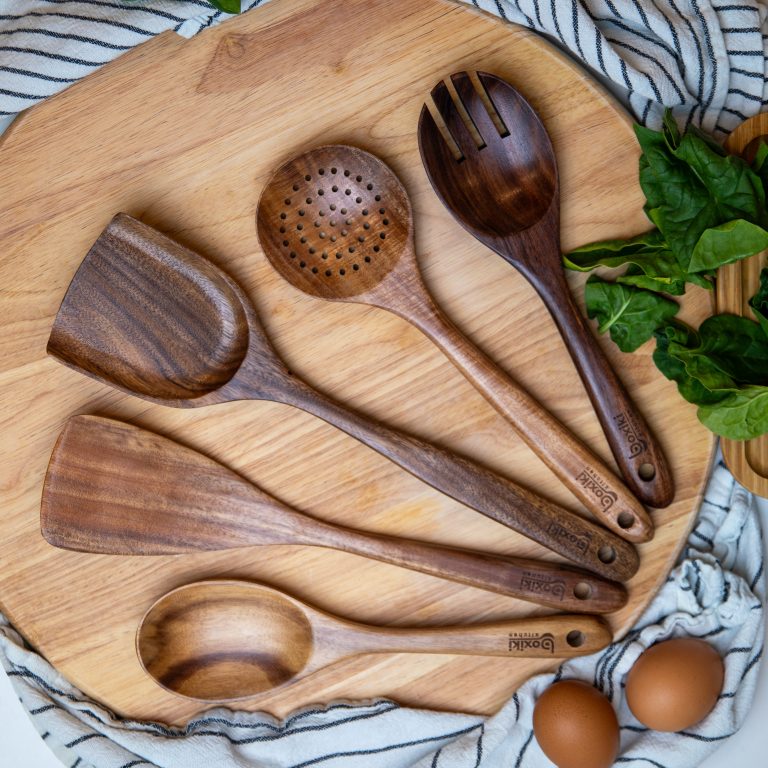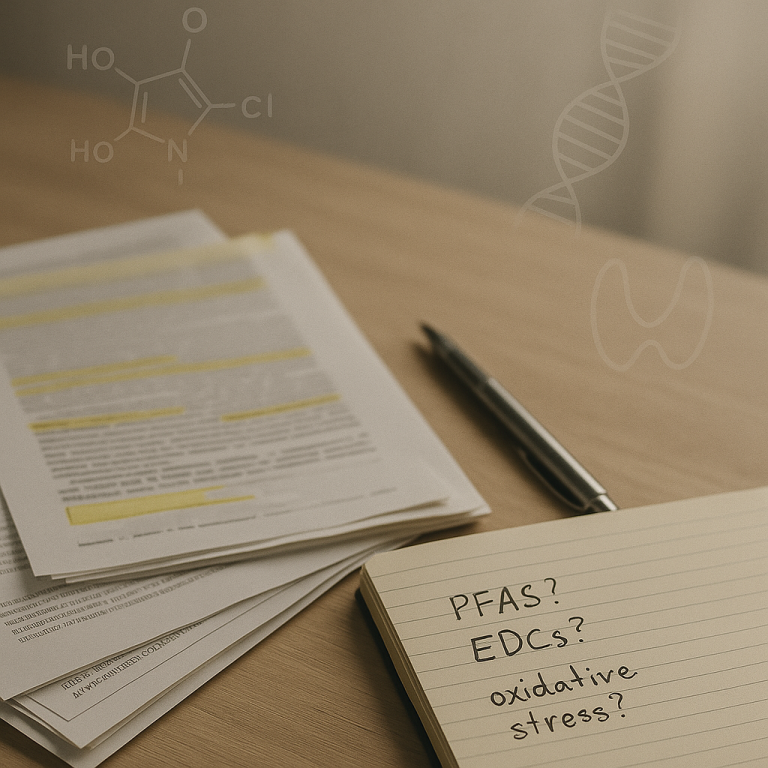🅶🅰🅻🆄🆅
ADVERTORIAL
Why My Aunt ‘s Cancer Made me Throw Out Every Plastic Utensil in My Kitchen
By Victoria Miller
The moment everything shifted
I’m a mom, a home cook, and — like many women my age — I’ve spent years juggling meals, work, and trying to make healthy choices for my family.
But when my Aunt Sarah — the aunt who taught me to whisk pancake batter without lumps and to taste the soup before salting it — was diagnosed with cancer, the ground under my kitchen changed. Not just emotionally. Practically.
Suddenly, I was staring at the plastic spatulas with the peeling edges. The nonstick flippers I’d scraped against hot pans for a decade. The cheap, mystery-wood spoons that smelled faintly… synthetic when they hit the heat.
How many toxins are hiding in plain sight — in our kitchens, in our cookware, in the tools we trust every day?
And I didn’t realize that either—until someone I loved got sick.
It shook me. And it made me act.
The quiet, everyday exposures we don’t talk about
Aunt Sarah’s oncologist explained something that lodged deep in me:
cancer isn’t one moment — it’s an accumulation. Cells damaged over time. Oxidative stress. Disruptions that sneak in through air, water, packaging, and yes — the tools and surfaces our food touches.
I went down the research rabbit hole (the one so many of us find after a diagnosis happens to someone we love). Here’s what kept me up at night:
PFAS (“forever chemicals”) — the kind used historically in some nonstick coatings — are persistent in the environment and the human body, and are linked with potential cancer risk and hormone disruption, according to U.S. health agencies and peer‑reviewed studies.¹ ²
Endocrine‑disrupting chemicals (EDCs), which can be found in certain plastics and coatings, are associated with developmental, immune, metabolic, and reproductive effects.³
Oxidative stress — a key driver in cancer development — can be exacerbated by chronic exposure to certain environmental toxins.⁴
I wasn’t going to let fear paralyze me, but I also couldn’t pretend this information didn’t matter. So I started making swaps — not overnight, not in a panic, but with intention.
One of the simplest, most grounding changes? Switching my everyday cooking tools to high‑quality teak wood utensils.
Why teak wood, of all things?
Honestly, I didn’t start out hunting for “teak.” I was looking for non-toxic, durable, sustainable, and kind to my cookware. Teak kept coming up — and when I held my first teak spoon, I understood why so many chefs and home cooks swear by it.
Here’s what sold me:
No chemical coatings to flake into meals. Just solid, dense, naturally oily hardwood that resists moisture and warping.
Naturally gentle on pans — especially important if you’re transitioning away from older nonstick surfaces and investing in stainless steel, carbon steel, or cast iron.
Resilient and long‑lasting. Teak is famously dense and rot‑resistant (boat builders use it for a reason).
It feels good. Warm, grippy, solid. Not squeaky like silicone, not cheap like thin plastic. It’s a utensil you want your kids to inherit.
But the deeper reason? It gave me peace of mind. Every stir, flip, and scrape became one less micro‑exposure I had to worry about.
The problem → the struggle → the breakthrough
Problem: I realized I had no idea what most of my utensils were actually made of — or what they released when heated, scratched, or aged.
Struggle: Replacing a kitchen full of “perfectly fine” tools feels overwhelming — and expensive. And it’s hard to know what to trust in a market full of greenwashing.
Breakthrough: I committed to a simple rule: If it touches heat or food regularly, it has to be safe, stable, and time‑tested. That put teak wood utensils at the top of my list. From stirring sauces to flipping eggs, I started there.
I didn’t overhaul my entire kitchen. I just began where I stood — with the spoon in my hand.
What the research says (and why it matters in a mom’s kitchen)
Let’s be clear: no single wooden spoon will prevent cancer—that’s not how biology works. Instead, swapping everyday tools can help you feel more confident that you’re minimizing unnecessary chemical exposures.
The U.S. Agency for Toxic Substances and Disease Registry (ATSDR) notes that certain PFAS can remain in people’s bodies and the environment for long periods, with associations to cancers and immune effects.¹
A 2022 paper in Environmental Health Perspectives examined PFAS exposure and its links to oxidative stress and inflammation — two biological processes tied to cancer development.²
The Endocrine Society and numerous peer-reviewed reviews have cataloged how endocrine‑disrupting chemicals — many found in plastics, coatings, and food-contact materials — can interfere with hormone systems even at low doses.³
The National Cancer Institute explains how chronic oxidative stress contributes to DNA damage and cancer initiation — and how environmental exposures matter.⁴
So no, a teak spatula is not a magic wand. But in a world we can’t fully control, it’s one of the quiet, daily levers we can pull. And if you’ve ever watched someone you love sit through treatment, you know how those levers feel like lifelines.
What teak wood utensils are:
- Solid hardwood (no mystery fillers)
- Naturally water-resistant and durable
- Smooth, non-reactive surface
- Biodegradable, often sustainably sourced (look for FSC-certified suppliers)
What they feel like in real life:
- Confidence: Stirring a simmering sauce without wondering what’s shedding into it.
- Relief: One less plastic tool on hot heat.
- Gentleness: No more micro-scratches on your cookware.
- Longevity: Tools that look better with age, not worse.
The set I chose — and why I trusted it
After weeks of comparing, reading reviews, and asking way too many questions (as my husband will confirm),
I chose a complete teak wood utensil set that included:
A slotted spoon (my favorite for veggies)
A Skimmer (my favourite filter spoon)
A deep ladle (for broths and weekend bone soups)
A flat turner (great for delicate fish)
A pasta server (no more spaghetti tangles)
A wok spatula (because stir-fries are a weeknight savior)
What made me hit “add to cart”:
Responsibly sourced teak with clear documentation
Food-safe finish (no polyurethane or mystery varnish)
Real customer photos showing the grain and color consistency
A brand voice that talked about health, not just aesthetics
“But are wooden utensils sanitary?”
“A fair question. Here’s what I learned: Properly finished, dense hardwoods like teak don’t absorb and harbor moisture the way softer, poorly sealed woods can. Teak’s natural oils provide an extra layer of resistance. Clean them with mild soap, don’t soak them, and re-condition with food-grade mineral oil or beeswax occasionally. They’ll outlast the plastic ones by years.”
What other people said (the social proof I needed)
“Great addition to the kitchen if you’re looking to replace all of your plastic utensils. Clean up easily, look beautiful too.”
Audry : 
Verified Purchase ꪜ
“Love love easily replaced plastic toxic kitchen tools”
Customer : 
Verified Purchase ꪜ
“The wooden utensils are great to use; they don’t get burnt and could leave it in the pot during cooking. They look classic. Easy to handle whilst frying food. Easy to wash even it gets oily.”
Bette Lim: 
Verified Purchase ꪜ
I still cook with Aunt Sarah’s recipes. I still call her when my bread won’t rise. But I cook differently now — with attention, with boundaries, and with the understanding that small choices compound over years, just like the risk factors we wish we could undo.
I can’t control everything. But I can control the handle I reach for.
If you’re where I was — staring into a drawer of aging plastics and wondering what’s safe — maybe start here. One wooden spoon.
One swap that supports the meals you already make, and the people you make them for.
Learn more about cooking without compromise. Explore why teak wood utensils are becoming the quiet standard for health-conscious kitchens — and see if they belong in yours.
If you’re ready to take one simple, meaningful step toward a lower-toxin kitchen, consider starting with a teak wood utensil set.
Read the sourcing, check the finish, and choose the tools you’ll use every day.
Your future self — and your family — will thank you.
(This advertorial does not constitute medical advice. Always consult your physician for guidance specific to your health.)
🅶🅰🅻🆄🆅
Home / Privacy Policy / TERMS + CONDITIONS / COPYRIGHT @2025 GaLuv. ALL RIGHTS RESERVED
DISCLAIMER: THIS IS AN ADVERTISEMENT AND NOT AN ACTUAL NEWS ARTICLE, BLOG, OR CONSUMER REPORT. The content on this site and the story presented are for promotional purposes only. Any experiences or testimonials featured are illustrative and may not reflect the typical results you achieve with these products. This page may receive compensation for purchases made through links on this site. PRODUCT DISCLOSURE: These utensils are not intended to diagnose, treat, or improve any medical condition. They are designed for everyday kitchen use and enjoyment.




